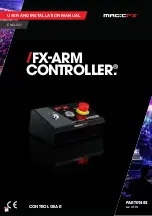
1.1.
PERSONAL PRECAUTIONS
Ensure that there is another person within hearing range and close enough to come to your aid, should a problem
arise when working near a lead-acid battery.
Wear safety eye protection and protective clothing. Avoid touching eyes while working near battery.
Have fresh water and soap nearby in case battery acid contacts skin, clothing, or eyes.
Wash immediately with soap and water if battery acid contacts skin or clothing. If acid enters eye, flush eye immediately with cool,
clean running water for at least 15 minutes and seek immediate medical attention.
Remove personal metallic items such as rings, bracelets, necklaces and watches. A battery can produce a short-circuit current which
is high enough to weld such items to the vehicle and cause severe burns.
Ensure that hands, clothing (especially belts) are clear of fan blades and other moving or hot parts of engine. Remove ties and contain
long hair.
DO NOT
smoke or allow a spark or flame in the vicinity of the battery or engine.
1.2.
GENERAL SAFETY INSTRUCTIONS
Familiarise yourself with the application, limitations and potential hazards of the unit.
Also refer to the vehicle manufacturer’s hand
book. IF IN ANY DOUBT CONSULT A QUALIFIED VEHICLE ELECTRICIAN.
Ensure that the unit is in good condition before use. If in any doubt do not use the unit and contact a qualified electrician.
Only use recommended attachments and parts. To use unapproved items may be dangerous and will invalidate your warranty.
Keep tools and other items away from the engine and ensure that you can see the battery and working parts of engine clearly.
Keep children and unauthorised persons away from the work area.
DO NOT
disassemble the unit for any reason.
WARNING
! To prevent the risk of sparking, short circuit and possible explosion
DO NOT
drop metal tools in the battery area, or allow
them to touch the battery terminals.
DO NOT
use the unit outdoors, or in damp, or wet locations and
DO NOT
use in the vicinity of flammable liquids or gases.
Ensure there is effective ventilation to prevent a build-up of explosive gases.
DO NOT
use the unit for a task for which it is not designed.
When not in use, store the unit carefully in a safe, dry, childproof location.
INSTRUCTIONS FOR:
DIAGNOSTIC SOCKET MEMORY SAFE -
EOBD
MODEL No:
VS2073
DANGER! BE AWARE, LEAD-ACID BATTERIES GENERATE EXPLOSIVE GASES DURING NORMAL BATTERY OPERATION. FOR
THIS REASON, IT IS VERY IMPORTANT TO READ AND FOLLOW THESE INSTRUCTIONS CAREFULLY, EACH TIME YOU
USE THE MEMORY SAFE.
Follow these instructions and those published by the battery and vehicle manufacturers, and the
maker of any equipment you intend to use in the vicinity of the battery. Remember to review warning marks on all products and
on engines.
Professional low cost tool saves all the vehicle settings to prevent loss and expensive reprogramming not just for radio codes but for
immobilisers, traction control, engine management and satellite navigation. Bright, easy to read LEDs for at-a-glance confirmation of
connection. Must be used with any existing booster packs with a standard AUX socket or even vehicle-to-vehicle.
Original Language Version
VS2073 Issue: 1 - 22/04/14
IMPORTANT:
PLEASE READ THESE INSTRUCTIONS CAREFULLY. NOTE THE SAFE OPERATIONAL REQUIREMENTS, WARNINGS & CAUTIONS. USE THE
PRODUCT CORRECTLY AND WITH CARE FOR THE PURPOSE FOR WHICH IT IS INTENDED. FAILURE TO DO SO MAY CAUSE DAMAGE AND/OR
PERSONAL INJURY AND WILL INVALIDATE THE WARRANTY. KEEP THESE INSTRUCTIONS SAFE FOR FUTURE USE.
Thank you for purchasing a Sealey product. Manufactured to a high standard, this product will, if used according to these
instructions, and properly maintained, give you years of trouble free performance.
1. SAFETY
2. INTRODUCTION
3. SPECIFICATION
Model No: . . . . . . . . . . . . . . . . . . . . . . . VS2073
Cable Length: . . . . . . . . . . . . . . . . . . . . . . . . 1.8m
Connection: . . . . . . . . . . . . . . . . . . . . . . . . EOBD
NOTE:
Some vehicle manufacturers
DO NOT
allow the use of a memory saver through the OBDII. Consult the vehicle manufacturer
before use, to determine if a memory saver is acceptable for use on the vehicle.
4.1.
Make sure that the power source used is greater than or equal to 12VDC. If using a portable battery device, make sure it is fully charged.
4.2.
Turn off the vehicle and make sure all accessories are off.
4.3.
Wait at least 30 minutes before using Memory Safe. This ensures that the accessories are no longer drawing current from the car battery.
Current draw must be measured to be less than or equal to 2Amps maximum before attaching the Memory Safe to the vehicle.
4. OPERATION
© Jack Sealey Limited
WARNING:
EXPLOSIVE
MATERIAL
WEAR EYE
PROTECTION
CORROSIVE




















